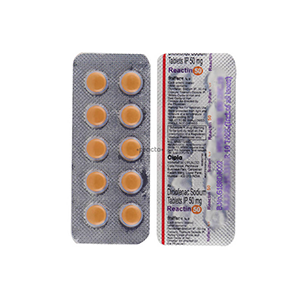
We accept Bitcoins
Get 10% discount!!!
Reactin

The image may differ from the actual product
Manufacture: CIPLA
Diclofenac is used in fever, headache, arthralgia, muscle pain, dental pain, post operative pain, pain during menstruation, osteoarthritis, rheumatoid arthritis, ankylosing spondylitis and gout.
Generic Name: Diclofenac.
Brand Name: Reactin, Cataflam, Voltaren, Voltaren-XR.
This medication description is not meant for treatment prescription without the intervention of a specialist
Common Uses:
Reactin 50 MG Tablet DT is a Non-steroidal anti-inflammatory (NSAID) drug used to treat pain associated with conditions like Gout, Migraine, Rheumatoid Arthritis, sprains of muscles and joints etc. In some cases, it is also used to treat mild to moderate fever.
How to use:
Take this medication exactly as it was prescribed for you. Do not take the medication in larger amounts, or take it for longer than recommended by your doctor. Follow the directions on your prescription label.
If you switch brands of Voltaren, your dose needs may change. Follow your doctors instructions about how much medicine to take.
Do not crush, chew, or break an extended-release tablet. Swallow the pill whole. It is specially made to release medicine slowly in the body. Breaking the pill would cause too much of the drug to be released at one time.
If you take Voltaren for a long period of time, your doctor may want to check you on a regular basis to make sure this medication is not causing harmful effects. Do not miss any scheduled visits to your doctor.
Warning and Precautions:
Taking an NSAID can increase your risk of life-threatening heart or circulation problems, including heart attack or stroke. This risk will increase the longer you use an NSAID. Do not use this medicine just before or after having heart bypass surgery (also called coronary artery bypass graft, or CABG). NSAIDs can also increase your risk of serious effects on the stomach or intestines, including bleeding or perforation (forming of a hole). These conditions can be fatal and gastrointestinal effects can occur without warning at any time while you are taking an NSAID. Older adults may have an even greater risk of these serious gastrointestinal side effects.
Important safety information:
This medicine can increase your risk of life-threatening heart or circulation problems, including heart attack or stroke. This risk will increase the longer you use Voltaren. Do not use this medicine just before or after having heart bypass surgery (also called coronary artery bypass graft, or CABG). This medicine can also increase your risk of serious effects on the stomach or intestines, including bleeding or perforation (forming of a hole). These conditions can be fatal and gastrointestinal effects can occur without warning at any time while you are taking Voltaren. Older adults may have an even greater risk of these serious gastrointestinal side effects.
Do not use any other over-the-counter cold, allergy, or pain medication without first asking your doctor or pharmacist. Many medicines available over the counter contain aspirin or other medicines similar to Voltaren (such as ibuprofen, ketoprofen, or naproxen). If you take certain products together you may accidentally take too much of this type of medication. Read the label of any other medicine you are using to see if it contains aspirin, ibuprofen, ketoprofen, or naproxen. Do not drink alcohol while taking Voltaren. Alcohol can increase the risk of stomach bleeding caused by Voltaren. Avoid exposure to sunlight or artificial UV rays (sunlamps or tanning beds). Voltaren can make your skin more sensitive to sunlight and sunburn may result.
Side Effects:
Get emergency medical help if you have any of these signs of an allergic reaction: hives; difficulty breathing; swelling of your face, lips, tongue, or throat. Stop taking Voltaren and seek medical attention or call your doctor at once if you have any of these serious side effects: chest pain, weakness, shortness of breath, slurred speech, problems with vision or balance; black, bloody, or tarry stools; coughing up blood or vomit that looks like coffee grounds; swelling or rapid weight gain; urinating less than usual or not at all; nausea, stomach pain, low fever, loss of appetite, dark urine, clay-colored stools, jaundice (yellowing of the skin or eyes); fever, sore throat, and headache with a severe blistering, peeling, and red skin rash; bruising, severe tingling, numbness, pain, muscle weakness or fever, headache, neck stiffness, chills, increased sensitivity to light, purple spots on the skin, and/or seizure (convulsions).
Overdose:
Seek emergency medical attention if you think you have used too much of this medicine. Symptoms of a Voltaren overdose may include nausea, vomiting, stomach pain, drowsiness, black or bloody stools, coughing up blood, shallow breathing, fainting, or coma.
Missed Dose:
Take the missed dose as soon as you remember. If it is almost time for your next dose, skip the missed dose and take the medicine at your next regularly scheduled time. Do not take extra medicine to make up the missed dose.
Do not use this medicine:
If you have any allergic reaction to any component of this medicine.
Storage conditions:
Voltaren should be kept away from heat, direct light, water, moisture at a room temperature (approximately 23 degrees C). The medicine should be kept in a place unreachable for children.
All information given above is a summary. You must visit your doctor, pharmacies or health care provider can provide more information about this medicine. Do not share this medicine with others for whom it was not prescribed. Do not use this medicine for other health conditions. Do not store medication with end term of storage.

 English
English 









